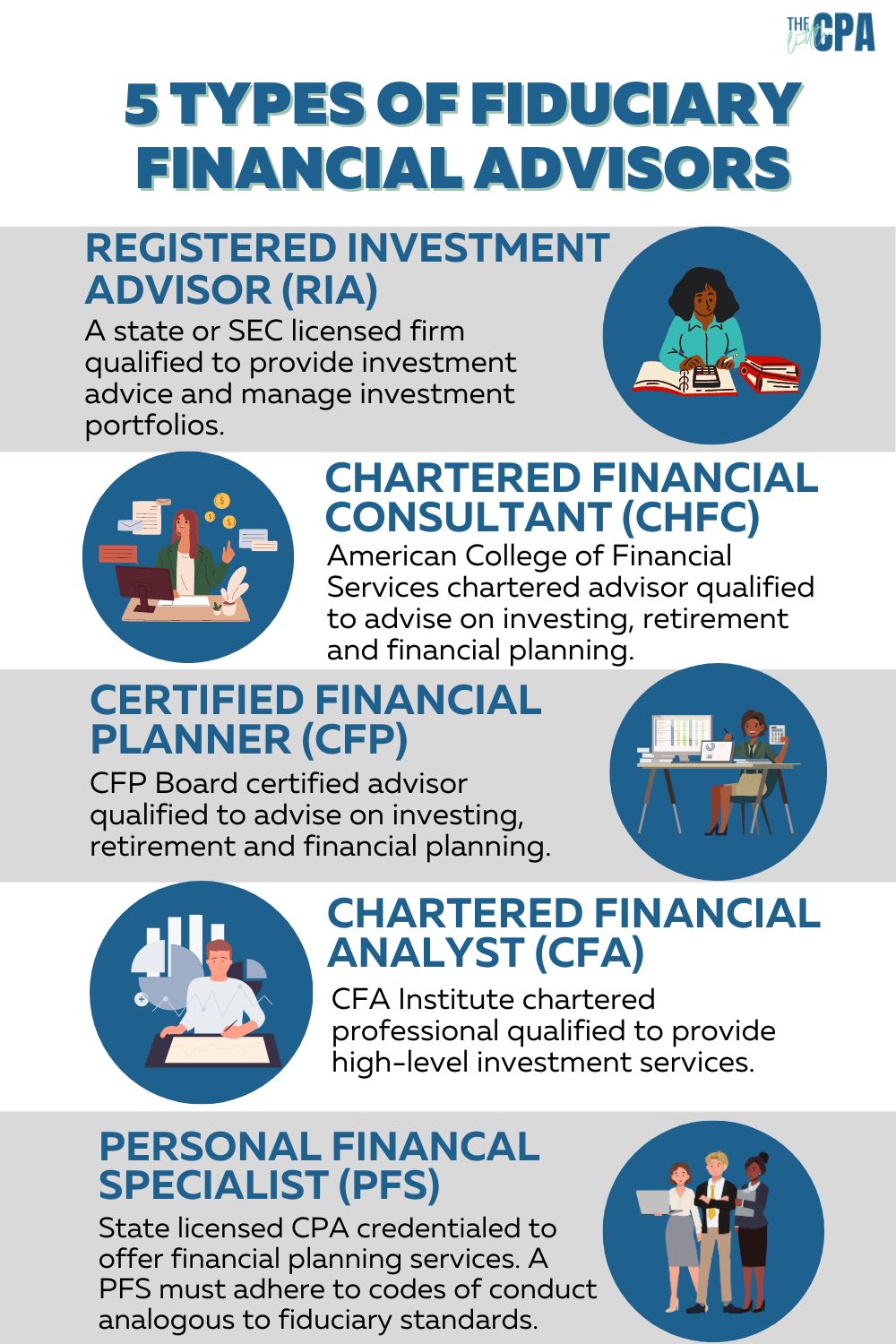
Key Takeaways on the Differences between a Fiduciary vs. Financial Advisor:
- Fiduciaries undergo a rigorous process to earn their credentials, including education, exams, and work experience, while financial advisors may not have the same demanding requirements.
- Fiduciaries often charge fees based on assets managed or an hourly rate, ensuring transparency and alignment of interests, whereas financial advisors may earn commissions, potentially creating conflicts of interest.
- Fiduciaries are often more qualified to provide retirement, long term savings, estate-planning and high-stake investment services.
____________________
You may have heard the terms ‘fiduciary’ and ‘financial advisor’, but do you really know what they mean for your own investments and long-term goals?
In this blog post, we’ll cover exactly who is considered a fiduciary vs. who is considered a financial advisor, as well as explore why it’s so important to understand their differences when managing your money.
Who is a Fiduciary?
A fiduciary is a financial professional who is legally obligated to act in the best interest of their clients. They must set aside personal interests and prioritize clients’ financial well-being.
The definition of a fiduciary differs under the Department of Labor (ERISA), the Investment Advisers Act of 1940, and among other regulatory bodies. However, in all cases, a fiduciary is expected to steer clear of conflicts of interest or self-dealing that could inflict harm on the person they represent.
Examples of financial fiduciaries include:
- Certified Financial Planners (CFP) – CFP Board certified advisor qualified to advise on investing, retirement and financial planning.
- Chartered Financial Analyst (CFA) – CFA Institute chartered professional qualified to provide high-level investment services.
- Registered investment Advisor (RIA) – A state or SEC licensed firm qualified to provide investment advice and manage investment portfolios.

Who is a Financial Advisor?
In general, a financial advisor advises on financial matters. Financial advisors can be anything from insurance agents, to stock brokers to online financial coaches.
Fiduciaries can also be financial advisors, but not all financial advisors are fiduciaries.
Financial advisors who are not fiduciaries may operate under different standards, such as suitability or the “best interest” standard, which allows them to recommend products that are suitable for clients’ needs but not necessarily the absolute best option.
Fiduciary vs. Financial Advisor: 5 Key Distinctions
1. Qualifications
Most fiduciaries undergo a rigorous process to earn their credentials. The process normally includes stringent education, exams, and work experience.
For instance, an aspiring CFA must obtain a bachelor’s degree, pass a challenging three-part exam and accumulate over 4,000 hours of work experience.
Financial advisors, however, don’t face the same demanding education requirements, which may impact their ability to provide certain financial services.
2. Compensation
Some fiduciaries charge a fee based on a percentage of assets managed or an hourly rate. These types of fiduciaries are often referred to as “Fee-Only Advisors.” Fee-Only Advisors have a transparent fee structure, ensuring their interests align with their clients.
On the other hand, it is common for financial advisors to earn commissions by selling certain financial products, potentially creating conflicts of interest.
Keep in mind, some fiduciaries are allowed to earn commissions so long as all products are sold with the client’s best interest in mind.
3. Conflicts of Interest
Fiduciaries have a legal obligation to disclose any potential conflicts of interest and avoid them whenever possible.
Financial advisors are not always bound by the same strict fiduciary duty – even though they still might disclose any conflicts to their clients.
4. Social Media
Have you ever wondered why the most popular financial influencers do not hold any type of fiduciary license or credential?
Well, here’s why.
Regulatory compliance standards limit what certain fiduciaries can post on social media.
For fiduciaries, disclosing confidential client financial information or generic investment advice is a big no-no. Certain fiduciaries are also required to archive all social media posts, including any client responses or inquiries.
Financial advisors, on the other hand, are not subject to the same regulatory standards. This is why you might see certain financial influencers share client success stories, create an online course with generic investment advice and share paid advertisements on social media. As non-fiduciaries, they have more freedom to share financial information with the public – which is either helpful or dangerous, depending on who you follow.
5. Legal Requirements
Fiduciaries are regulated by governing bodies such as the Securities and Exchange Commission (SEC), the Department of Labor (DOL), or other regulatory Board. If they don’t meet specific standards and adhere to ongoing education requirements, they could lose their license, incur fines or face other severe consequences.
Financial advisors may or may not have varying levels of regulatory oversight depending on their role and the products they offer.
Normally, self-proclaimed financial advisors who seek their clientele on social media are regulated only when reported to a regulatory agency. So, a non-fiduciary influencer who promotes themself as a financial advisor will often only face consequences for bad advice when reported for promoting a pump-and-dump scheme, money laundering or other illegal act.
{Check out Finfluencers Exposed: How to Protect Yourself from Social Media Influencer Scams}

When to Seek a Fiduciary’s Guidance
Financial advisors can offer plenty of helpful financial services.
If you search the #personalfinance hashtag on Instagram, you will see posts from a variety of financial coaches who have helped clients improve their budgets, manage debt, save towards financial goals and start their investment journey.
Having said that, financial advisors without the proper credentials and education are normally not qualified to offer certain financial services.
Here are a few financial services that are normally best provided by a fiduciary.
Retirement and Long-Term Savings Goals
When planning for retirement, it is highly advisable to utilize the services of a fiduciary.
For instance, a fiduciary can help you create a comprehensive retirement plan that takes into account factors such as your current financial situation, future income projections, and risk tolerance.
A financial advisor, on the other hand, could influence you to purchase certain life-insurance products or other investments towards retirement that help them earn commissions.
Self-proclaimed financial advisors can also overlook important factors when it comes to retirement planning – such as disability insurance, estate planning and diversified portfolios – due to their limited knowledge and education.
Complex Estate Planning
When it comes to planning for complex estates, there are several important legal and financial factors that need to be taken into consideration.
Th estate planning process involves income and estate tax considerations, asset protection, distribution strategies, jurisdiction-specific compliance and services from estate planning attorneys and tax professionals.
Professional guidance from fiduciaries can be invaluable in navigating the complexities of this crucial process.
High-Stakes Investment Decisions
When it comes to making significant investments with potential risks, such as starting a business, purchasing real estate, or navigating the stock market, a fiduciary’s unbiased advice can be invaluable.
Their duty to act in your best interest ensures they prioritize risk management and long-term financial goals.
Conclusion: Fiduciary vs. Financial Advisor
While financial advisors can offer valuable support, in certain situations, the fiduciary’s legal obligation to act in your best interest becomes paramount.
Before choosing a financial professional, consider their qualifications, certifications and experience. Consider searching FINRA BrokerCheck to look up advisors who are registered with the SEC.
Ask friends, family, and trusted advisors for recommendations. Personal referrals can provide valuable insights into a professional’s integrity, communication skills, and effectiveness.
Finally, take the time to interview potential advisors. Ask about their approach to financial planning, their fee structure, and how they handle conflicts of interest. A face-to-face meeting or a virtual consultation will help you gauge their compatibility with your needs and values.
Disclaimer:
The information provided on this blog is for educational and informational purposes only. While every effort has been made to ensure the accuracy and reliability of the content, we do not make any representations or warranties of any kind, express or implied, about the completeness, accuracy, reliability, suitability, or availability of the information.
Please note that the financial advice and information presented on this blog are not personalized to your specific financial circumstances. It is essential to consult with a qualified professional, such as a financial advisor or accountant, before making any financial decisions or taking any actions based on the information provided here.
We strongly encourage our readers to conduct thorough research and verification independently. The information on this blog should not be considered as financial, investment, or legal advice. Any reliance you place on the information provided is strictly at your own risk.
It is important to understand that any financial product or service mentioned or promoted on this blog may have its own risks and potential drawbacks. We advise our readers to carefully read the terms, conditions, and fine print associated with any product or service before making any investment decisions.

